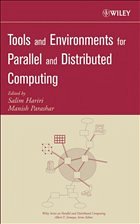Nicht lieferbar

Tools and Environment for Parallel and Distributed Computing
Versandkostenfrei!
Nicht lieferbar
Zugänge zur parallelen Rechentechnik: Dieses Buch behandelt ein breites Spektrum verschiedener Ansätze! Sie erhalten einen aufschlussreichen Überblick über die leistungsfähigsten derzeit gebräuchlichen Tools. Fallstudien stellen besonders erfolgreiche Implementationen (u. a. Stanford, MIT) vor. Im Vordergrund der Diskussion steht die Performance der Lösungen. Die Autoren arbeiten am renommierten Northeast Parallel Architectures Center.



